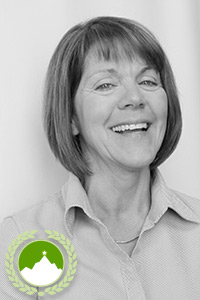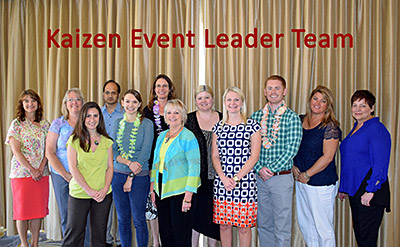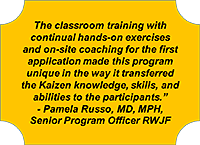News and Events
QI Innovator Award Winner - Kathy Lordo, MPAThursday, August 21, 2014 - This month, we are pleased to honor Kathy Lordo, from Hamilton County Public Health (HCPH) in Ohio, as a public health QI innovator. Kathy also wanted to acknowledge that QI is a team effort and that it would not be successful without her dedicated and passionate core team. Congratulations, Kathy! What makes Kathy Lordo a QI Innovator?
Kathy Lordo, of HCPH in Ohio, has spearheaded the agency’s continuous QI initiatives since the QI program was implemented in 2012. She has inculcated QI deeply into the agency’s culture. Under her leadership, HCPH has completed or is in the process of completing 21 formal QI projects. The agency is consistently recognized as a top-performing public health entity. Over the past 2 years, HCPH and its staff have been recognized with significant awards, culminating in one of its programs receiving the highest-level recognition in North America, the Samuel J. Crumbine Consumer Protection Award, which recognizes the top environmental health program in North America. Kathy has encouraged staff to participate in developing QI projects and forming QI teams. Her leadership has moved the QI process into a formal recognition structure with the county Board of Health. The process has allowed the team members to formally present results of their projects to the Board. Kathy has developed and leads the agency’s Continuous QI Council, which is charged with weaving QI into all areas of the agency. She is passionate about the QI process and consistently shares credit and recognizes players from QI teams for their successes. We asked Kathy to share some insights regarding challenges encountered, lessons learned, and advice about public health QI. Here's what she had to say! Q: Describe one challenge you have encountered in conducting QI in public health and how you worked to overcome that challenge. A: Inculcating a QI process into your organization doesn’t happen overnight. It’s a slow process, and it’s crucial to grow the process organically by developing program “champions,” who then cascade QI deeper into the organization by leading projects and mentoring future project leaders. By starting slowly and with a small core group, you can begin to demonstrate the value of QI and show that even with busy schedules, the process can be completed and the accomplishments are always worth the effort. We have a process in place to launch projects, present project work to an internal QI Council, track project progress and results, and incorporate improved processes into our regular plan of work. It’s important to point out that the success of the program is in large part due to a core group that has fostered the QI program into our agency and is dedicated to growing the program and its leadership. Q: What is one key lesson you have learned in your experience implementing public health QI initiatives? A: QI is a slow build. Start with a core team dedicated to a manageable project. Implement recommendations, share success (and credit!), and continue to introduce more people to the process. These will ultimately become your leaders and will begin a “snowball” effect of growing the QI culture in your organization. Q: What advice would you give to public health practitioners who are new to QI? A: Don’t be afraid to change! When people realize the process is doable and more important, that the results of their work will be implemented for process improvement, they begin to jump on board and embrace QI as a positive vehicle for change. Congratulations, Kathy! Thank you for sharing these wonderful insights, being a champion for public health QI, and being a member of the PHQIX community! |
|
COPPHI Kaizen Event Program - Article 1 of 4Monday, August 18, 2014 - Kaizen, meaning “change for the better”, is a team-based QI method gaining traction among public health professionals. PHQIX is launching a series of four articles authored by Expert Panel member Chris Bujak and his buisness partner Pam Vecellio, of Continual Impact LLC, that describe the Kaizen approach. We will also highlight 10 newly-published QI Initiatives from the COPPHI Kaizen Event Program in future articles. Would you like to have more speed, involvement, and results for your improvement projects? Click here to read the first article in our four-part series and stay tuned over the next few weeks for more information on the 10 Kaizen events! |
 |
Kaizen: Would you like to have more speed, involvement, and results for your improvement projects?Monday, August 18, 2014 - Would you like to have more speed, involvement, and results for your improvement projects? Written by PHQIX Expert Panel member Chris Bujak and his business partner Pam Vecellio, of Continual Impact LLC. Visit the Ask an Expert page for more advice from PHQIX Expert Panelists. Kaizen is a QI method that can help. The COPPHI Kaizen Event Program recently provided training for individuals from 10 health departments, through a competitive process, for intensive kaizen education, onsite coaching about application of the kaizen methodology, and participation in a learning community. The program was funded by the Robert Wood Johnson Foundation (RWJF), and managed by National Network of Public Health Institutes (NNPHI); training and coaching were provided by Continual Impact LLC. Kaizen simply means “change for the better”. A kaizen event is a team-based approach to problem solving that flows through all phases of the improvement cycle effectively and rapidly. Before the event, a kaizen-appropriate problem is identified along with goals in areas such as customer satisfaction, cycle time and labor reduction, and error elimination. The team is then mobilized and a kaizen event begins. A typical event uses a systematic process to identify waste in the targeted work process, to enable the team to understand and analyze the root causes, to identify and test solutions, to learn, to install improvements, and to create a system for ongoing improvement. As the event progresses, numerous QI and change management methods and techniques are applied. All of this work is accomplished in a brief period of time, typically 5 days, with full benefits achieved within 1-3 months!  To prepare, the event leader team completed 48 hours of face-to-face foundational QI, kaizen, and facilitation education using an application-intensive, “Tell, Show, Do, Recycle” (receive feedback) Kaizen events can also be a powerful way to support Public Health Accreditation Board accreditation, engage people, See the program summary of the event results here. Over the next few weeks more information on the 10 Kaizen projects will be highlighted in future articles. |
 |
August Website Drawing!Tuesday, August 12, 2014 - It's time for our next website drawing, and you don't want to miss out! We'll randomly select two lucky winners to win a scholarship that covers registration and travel costs to attend the 2014 APHA Annual Meeting, November 15-19, in New Orleans! To enter the drawing, comment on a QI initiative or Community Forum post by September 12. Create a new Community Forum topic and you'll be entered into the drawing twice. |
 |
NICHQ Tips for Sustaining the Success of a QI ProjectWednesday, August 6, 2014 - Sustainability is an important component of all QI projects, but it doesn't happen automatically. The National Institute for Children's Health Quality (NICHQ) recently published four tips for sustaining the success of a QI project:
Read more about these tips in the full article here. |
 |
We're Listening!Thursday, July 31, 2014 - You've spoken and we listened! We’ve recently made some changes to the PHQIX website based on feedback we’ve received from the PHQIX community. Check out some of our latest enhancements:
|
 |
QI Innovator Award Winner - April Harris, MPH, CHESFriday, July 25, 2014 - Earlier this year, we invited public health practitioners and members of the PHQIX community to nominate innovative QI practitioners to recognize their hard work in championing a QI effort and culture. We received such wonderful nominations that we couldn’t pick just one winner! We're announcing one winner at a time, starting with Ms. April Harris, from Three Rivers District Health Department (TRDHD) in Kentucky. Congratulations, April! We are so pleased to honor you as a QI innovator! What makes April Harris a QI innovator?
April Harris, the first QI Coordinator of her agency, TRDHD, exudes professionalism and diligently promotes QI in public health. One of her agency’s projects, the Three Rivers Thriller, received national attention. The QI team dressed as zombies to dramatize an introduction to the decision-making matrix, a QI tool. Staff members used the matrix to select the best weapon to ward off the zombies. April’s QI leadership has contributed to other successful projects, which include restructuring the agency’s shared network drive through a Kaizen event, increased participation in Mobilizing for Action through Planning and Partnerships, and a revised National Public Health Performance Standards Program facilitation. April, who is also TRDHD’s Accreditation Coordinator, organized the first mock site visit and documentation review in the accreditation process, which assisted TRDHD in achieving national accreditation in the first cohort. She created a format that trains other accreditation coordinators and provides valuable feedback for health departments in the documentation review phase of the process. The mock site visit format has been emulated across Kentucky and in state and local health departments across the country. April’s passion, enthusiasm, and excitement about public health and QI are contagious. She is progressive in thinking of new ways to incorporate QI into her agency’s processes and programs, and she is always willing to share ideas or lessons learned with others. Her unique way of approaching challenges attests to her motivation and highlights the value of her efforts. We asked April to share some insights regarding challenges encountered, lessons learned, and advice about public health QI. Here's what she had to say: Q: Describe one challenge you have encountered in conducting QI in public health and how you worked to overcome that challenge. A: Getting everyone involved and understanding that QI happens every day has been a challenge. One way I’ve worked to overcome the myth that QI equates “big projects” is posting QI storyboards and flowcharts in commonly seen areas of our health departments. This helps to reinforce our culture of quality improvement while educating our staff about projects and outcomes. Q: What is one key lesson you have learned in your experience implementing public health QI initiatives? A: Celebrate successes and make it fun (which can be applied to anything)! We devote time at each staff meeting to discuss quality improvement projects and recognize those that have had positive results. The TRDHD staff have come to expect skits, prizes, and off-the-wall antics to keep everyone engaged and having a good time with QI. Q: What advice would you give to public health practitioners who are new to QI? A: Start with Domain 9 in PHAB’s Standards and Measures—it will direct you to the policies, processes, and trainings that your agencies can work towards in your QI journey. Also, get in touch with peers that are seasoned in QI and network about ideas and projects. Thank you, April, for sharing your insights, for inspiring other public health QI practitioners, and for being a member of the PHQIX community!
|
|

 approach to solidify the learnings. During the preparation and post-event, each event leader received personalized coaching. Ten kaizen events were then conducted (one at each site) where each event leader co-led the event with an onsite Continual Impact LLC coach helping and providing feedback. Each event team completed all phases of the improvement cycle and then immediately followed up by rolling out the new process and installing an ongoing improvement system for monitoring progress and creating even more improvements!
approach to solidify the learnings. During the preparation and post-event, each event leader received personalized coaching. Ten kaizen events were then conducted (one at each site) where each event leader co-led the event with an onsite Continual Impact LLC coach helping and providing feedback. Each event team completed all phases of the improvement cycle and then immediately followed up by rolling out the new process and installing an ongoing improvement system for monitoring progress and creating even more improvements! and help develop a culture of improvement in your agency. Kaizen leverages the power of the people who perform the work; engages leadership in a meaningful and supportive fashion; focuses the improvement so it aligns with the organization’s needs and can be done rapidly; uses learning from the work site to identify practical solutions; applies numerous, detailed improvement methods during the event to empower the individual and effectively solve problems; and implements the solutions quickly and sets the stage for further improvements.
and help develop a culture of improvement in your agency. Kaizen leverages the power of the people who perform the work; engages leadership in a meaningful and supportive fashion; focuses the improvement so it aligns with the organization’s needs and can be done rapidly; uses learning from the work site to identify practical solutions; applies numerous, detailed improvement methods during the event to empower the individual and effectively solve problems; and implements the solutions quickly and sets the stage for further improvements. 